
|
GANESHJI OF GANPATYAR
So near yet so far |
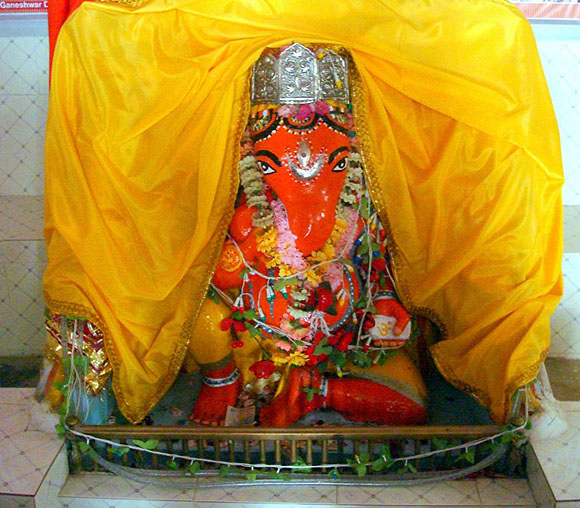 *B. L. Dhar |
|
Ganakak had taken ample precaution this winter to carry his walking stick and a torch in the night. He remembered last year he had slipped while going up the road incline just before entering the road leading to his house and barely escaped getting hurt. He also avoided walking in the center of the road for fear of being hit by a Tonga and also because of the slush that was created by these vehicles. In fact walking on the shoulders provided him a firmer grip in the piled up snow and it was cleaner as well. He noticed the shop of Gaffar, the cobbler, still open and called to him telling him his shoes were leaking and he would drop the pair for repairs next day. I should buy a new pair now, he thought, but these were so costly these days that it burned a big hole in the pocket. Thinking about the hole he remembered he should visit Jialal, the grocer, and ask him to pack his pouch of tobacco for the hookah. He tried to recollect if there was anything that Shobawati had asked him to get along upon his return home in the evening. Not remembering anything that could not wait, he entered the lane towards his house and found his neighbor Radhakishan waving at him from his main door. After an exchange of greetings, Radhakishan handed over the prayer book he had loaned from him a week ago that he required for the “Shraad” ceremony of one of his clients. He was a priest and conducted functions as per the Vedic rites. Ganakak had now almost given up the client work after the demise of his father, except catering only to one family, and taken the full responsibility of looking after the Shiva temple on a daily basis for favor of a regular income. The members of the temple trust were pleased at his running the affairs like his father had done before him and allowed him to keep all the offerings in kind. All cash offerings received daily were put in the temple safe. He had to tender the cash in the safe to the managing committee every Sunday and received a percentage of the collection as salary every time the safe was opened. The upkeep and maintenance of the temple was managed by the trust and he had no role to play in this regard. He was happy with the arrangement and his needs were taken care of. |
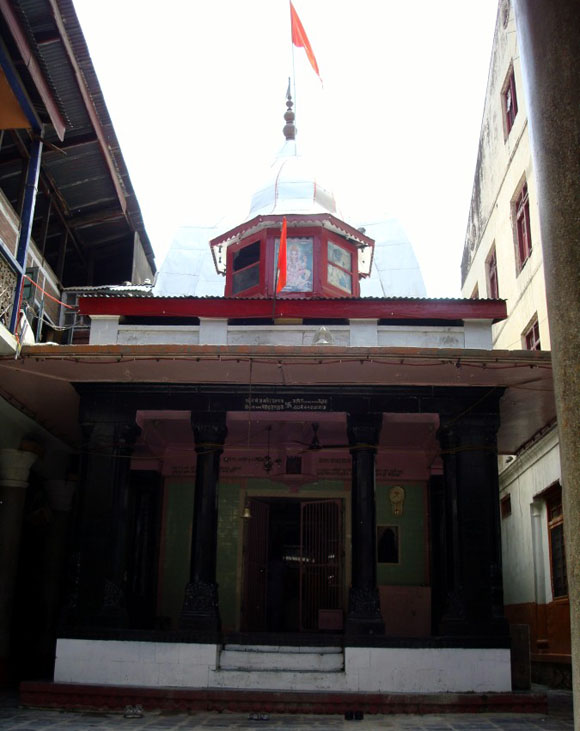 Ganpatyar Temple overview |
| Ganakak
woke up early on the morning of his birthday, had his bath at the
Vitásta ghat at Ganpatyar as usual and entered the Ganesh temple for
prayers. Back home Shobawati had kept the puja thali, containing “täher”
ready for his ritualistic offering after which he left home for the
Shiva temple. The snowfall had now turned mild and did not accumulate on
the ground but there was no guarantee that it would not resume
forcefully later. The festival of Shivratri was round the corner and
Ganakak would have a spurt in his income during this period as more
devotees poured into the Shiva temple on this festive occasion and
donated liberally. His son had informed him that he would not after all
be coming home for his own birthday in March and the Shivratri festival
soon thereafter as he had not been granted leave from his duties. What
kind of work was this after all that one could not attend to the social
and religious commitments and responsibilities. He had looked forward to
meeting his grandchildren after a long gap of six months and was
missing their chatter and their pranks. Two grandsons and a grand
daughter used to keep the house on alert all the time as they fought at
opportunities to prove their love for their grandparents. Shobawati had
taken their absence very much to heart and mostly remained quite. In
fact there was hardly any conversation between the couple other than to
communicate about things of mundane interest. Prem Nath was posted as an Assistant Executive Engineer with the Buildings & Roads department at Srinagar and was a well-known figure in his circle of relatives, friends and associates. He was the son of an illustrious college professor, now deceased, and his family had a long history of being social and religious and carried references from all the high and mighty in the valley. Prem Nath received prominence in his work from the government of Bakhshi Gulam Mohammad, who was the Prime Minister of the state from 1953 onwards. Now in the 10th year of his regime in 1963 the state looked to be well placed among the best-governed states in the country. Tourism had flourished and so had the trade and new industries had been set up in many new ventures all across the state for the benefit of the citizens. J&K was the only state in India that was referred to as a peaceful state with Hindus, Muslims and Sikhs living a life of peaceful co-existence, a secular state to the core. Prem Nath was also lucky to have Ganakak as his family priest, who worked for no other family. Ganakak always found time to cater to the family needs whenever the occasion demanded as was done by his own father before him and his grandfather many decades ago. Of utmost importance was the festival of Shivratri, which was celebrated with all the dignity it deserved and with religious zeal. So much effort was put in by Ganakak that he observed a fast for the whole day and only ate with the family later after the conclusion of the Shiv “puja” around midnight. Doubtless to say that he always received a handsome reward for his services that no other family would ever have offered. Prem Nath had a great reverence for his priest and respected him immensely. |
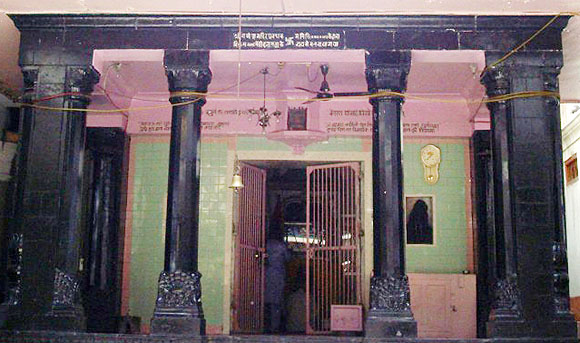 GanpatyarTemple main diety entrance door |
| The
festival of Shivratri was not as important to the people at Udhampur as
it was for the miniscule minority of the Kashmiri Pandits living in the
township. These were people who lived there because of their trade or
job and who could not possibly visit Srinagar for the celebration with
other family members. Raghunath was one among the unfortunate who did
not travel home to join his parents. He had responsibility of
distributing more mail during this season and also disbursing money
orders that were exchanged as gifts to relations. His own father had
sent him some money as a gift for the kids and he felt humbled. He
matched the sentiments of his father by sending him a thank you note
that sounded hollow to his own consciousness. He loved his father who
had taught him what life was all about. He could not have helped the
state of affairs that he found himself in just because like everyone
else he was fallible. He had in fact arranged his transfer from
Srinagar, as he was unable to settle the differences in his own home.
Before shifting to Udhampur, Raghunath was painfully a witness to fights
between his mother and his wife almost everyday just on flimsy grounds
and he could not stop the enmity between them even with his best
efforts. The other reason for arranging a transfer was that his growing
family had shrunk the space in his small home they had inherited and no
one got any kind of privacy in that place. The house he lived in was
equally shared with his cousin who lived in the other half of the house
with his mother, his uncle having passed away a few years ago. He took
the best course and decided to stay away so that he could give equal
respect and care to the two women in his life without offending any one
of them. Though his father very much wanted him to be in the family
trade of being a priest, he detested the work. He would nevertheless
care about his parents and think of their well being and even when he
had his own three children to look after he always found time to visit
them. His father earned enough to look after self and mother yet he
carried gifts to them when he visited them. He was satisfied with this
arrangement and hoped the situation would change one day after the
construction of his dream home was realized. Nandbub, the great mystic saint of Kashmir is said to have entered the office of one Bakhshi Ghulam Mohamad one day and handed him a pen. He became the Prime Minister of the state. Some ten years later he once again entered his office and took the pen away from his hands and he lost his job. His years in the state as Prime Minister from 1953 to 1964 are acknowledged as the Golden Period of the state. He is remembered as the architect of modern Kashmir for his administrative skills and constructive work. In 1964 he was asked by the central government to offer a token resignation from office under the Kamraj Plan and was never reinstated. He retired from politics in 1965 but for his popularity was inducted in the Lok Sabha where he stayed on till 1971 and he passed away in 1972. Raghunath was also affected by changes and he shuttled on his numerous postings and finally landed up at Jammu on promotion as head clerk in 1972. He managed to find a piece of land for building his dream house with a financial contribution from his father. It took him five long years to start construction on the land and had to ask for a government loan to help him in this effort. His children had grown up and were now attending college at Jammu. Ganakak continued to be in Srinagar and engaged with his avocation as he kept growing in age. He never got a chance to visit his son and his family outside the valley but Raghunath visited his parents regularly and kept a proper watch on them. Often on his visits to the valley he would smell ugly sentiments that he brought to his father's notice, who promptly ignored it as a figment of his imagination. |
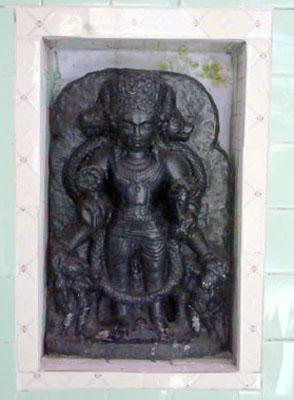 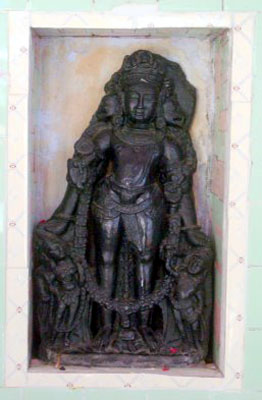 Ancient sculptures near entrance door |
| As
the years slipped through, Ganakak stood on a different track as his
“sadhna” entered the pinnacle of his self-attainment. He often had
vision of events yet to unfold. His mind was now at peace and his body
totally under his command. His wife would look with reverence at him
sometimes when he was in a trance and she would sit at his feet and pray
for his salvation and that of herself as well. Years passed as they
watched their son prosper and the grandchildren groom well in their
respective fields. Upon his retirement in 1980, Ragunath got his three
children married on three occasions at Srinagar. He beseeched his
parents to join him at Jammu every time after the ceremony and asked
them to stay on after giving up to live in that cramped house at
Srinagar. Ganakak did not respond for a very long time as he went into a
very thoughtful mood. He finally told his son that he would do so only
after he felt his responsibility at Ganpatyar was complete. Swallow (Kätiĵ) is a migratory bird and comes to the Kashmir valley in the spring and stays until the end of summer. About six inches long the bird has a forked tail and is a glossy shade of blue-black with a white underside. The birds nest only in homes or barns and come back to the same nest year after year and stay with the same mate for life, having a life span of about 4 - years. There was one such nest in the bedroom of Ganakak and he was very protective of these birds. He would welcome their appearance in spring and observe them fervently repairing their nest that they set up in the wooden beams of the ceiling. During the entire period of their stay his wife would keep the window of their bedroom open from early morning until dusk when the birds would finally settle down for the night. Shortly one would hear the chirping of their offspring and the birds would make several runs to feed their young during the whole day. One could mark their swift darts across the sky catching insects that they feed to the young. They finally fly out along with them at the end of the season. Ganakak was not happy when in the year of 1989 no swallows came to his room. He felt it was an inauspicious occurrence and prayed to God to let everything be all right. It did not occur to him that the birds that visited him last year may well be dead and the new tenants had yet to find the nest. Prem Nath woke up early morning on Sunday, the seventh day of January 1990 and decided to pray one last time at the Ganesh Temple at Ganpatyar before he left for Jammu later that morning with his family and all his belongings for which he had hired a transport. He was now 76 years old and not on his transfer to that place but was kind of fleeing the hometown after he had witnessed a disturbing trend in the mindset of the local populace who had given an ultimatum to the Hindus to either convert to their faith or be targets for their sharp shooters. There was an unprecedented rush of Hindus leaving the valley after terrorists gunned many down in cold blood. There were instances of torture of young innocents and sacrilege of women who were molested and then killed. Prem Nath did not wish that his family should meet a similar fate and had taken the decision after a thorough thinking over and discussing the matter with his family, friends and some relations who were already gone or were on their way out. He had packed up all his essentials for two days now and he would leave behind the heavy stuff like furniture, taking into account the fact that the situation may not last long. There was the government after all that would wake up some time to take necessary steps to safeguard the life and property of the minority community. He planned to securely lock up his house at Nai Sarak and return when the situation was under control. |
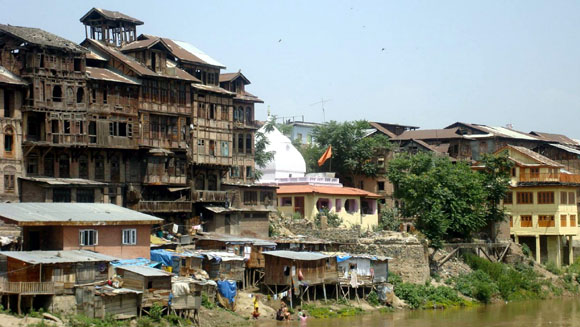 Jehlum river bank near Ganpatyar |
| Raghunath
learnt with pain about the migration of Hindus from the valley and he
was urging his father to leave the place at the earliest. His cousin had
already left with family and had set up a new abode at Jammu. He
decided to go to Srinagar and help father pack up things and urge him to
join the family at Jammu. They had luckily a big house now and his
dreams would come true when all the family was together once again. He
hoped that his wife and his mother would fight no more. His mother was
old and infirm but his father, though 88, was still in a better shape.
He would still require help in shifting out and Raghunath was pleased
when his father accepted the offer and Raghunath decided to leave for
Srinagar on Sunday the 7th January and bring his parents to Jammu on the
10th. Ganakak was adamant that he would celebrate his birthday at his
home on the 7th January and then only leave to enter the new house on
the auspicious day of 10th January. Shobawati reprimanded her husband for going to the Vitásta for his ritualistic forays on his birthday on the 7th January telling him that he would freeze to death, now that he was too old to stand any kind of torture to his body. But the old man would not listen and carried his paraphernalia along with him for the ceremony early morning. At the ghat he washed lightly but was saddened not to find his fellow worshippers who normally exchanged pleasantries with each other. He put on a clean dress and replaced his old sacred thread with a new one and climbed the steps to enter the Ganesh temple for his prayers. He felt very light in body and thought he was blessed and at the sight of the deity he felt cold shivers run down his frame. He took his seat at the foot of Ganesh idol and began his prayers. He asked the lord for forgiveness having decided to leave his home for the first time. He had never given up on his lord and he did not remember a day when he had not bowed before Him. His prayers went on and on and time was lost on him and he forgot there was somebody waiting for him at home. |
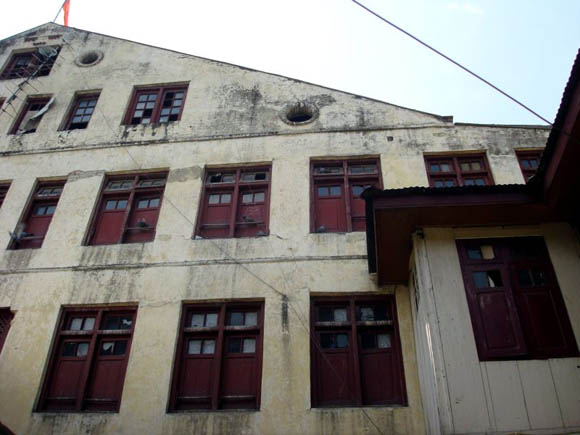 Ganesh Ghat School |
| Prem
Nath wanted to buy some fresh flowers for the deity but could not find
any at the local market where it was normally available. He retraced his
steps and went back home to collect some dried ones instead for the
offering. Once on his way back he felt some kind of a strange sensation
down his spine and an alien feeling when he saw the few people on the
road look strangely at him. He suddenly felt terror waves course through
his body. It would be plain stupid to take notice of an imaginative
feeling and he proceeded on. Reaching Ganpatyar he heaved a sigh of
relief and entered the temple premises with folded hands and a bowed
head. He saw an old man slumped in front of the deity and was overawed
with the enthusiasm of the man and wished he were as pious as this one
appeared to be. He said his prayers and stayed on for some time for the
old man to look up. A loud blaring of the muezzin’s call to prayers from
the nearby mosque jolted him. Seeing no change in the stance of the
prosaic man he approached and touching him lightly he turned his head to
see the face. He found it was his priest Ganakak who laid cold and dead at the feet of Lord Ganesha. |
| Images courtesy Vinayak Razdan |
SOME PHOTOS BY..........KASHYAP NEWS ARTICLE BY POSTED BY VIPUL KOUL EDITED BY ASHOK KOUL







No comments:
Post a Comment